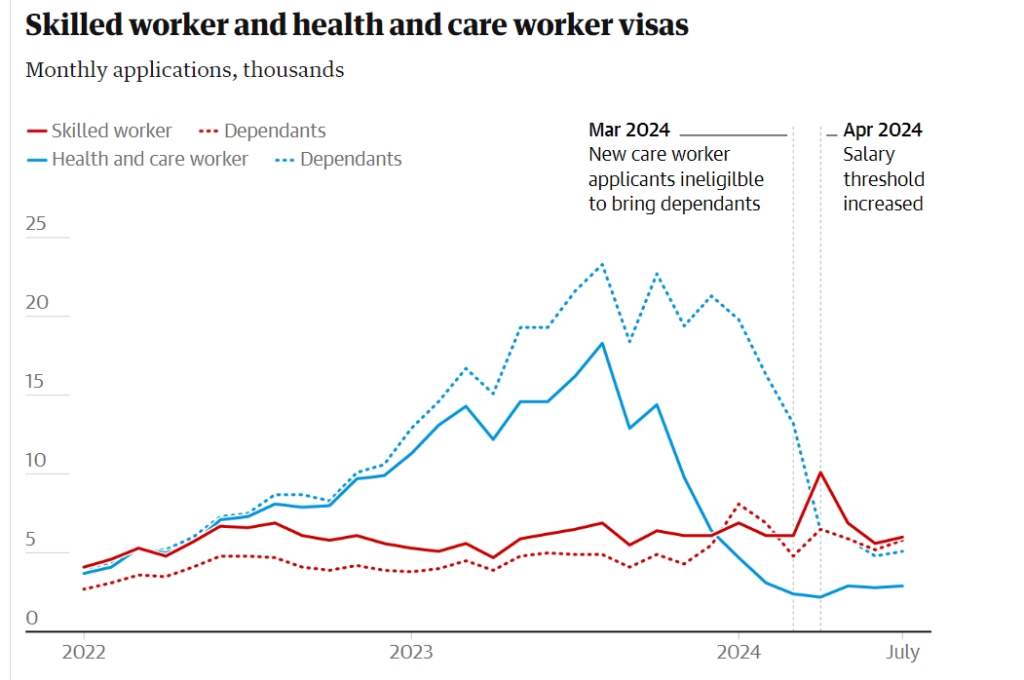Recent data indicates a significant drop in overseas workers and students seeking to enter the United Kingdom. This trend is a direct result of visa restrictions implemented by the previous government.
This decline is particularly noticeable in applications for skilled worker, health and care, and study visas, which saw a collective decrease of over one-third in July, with only 91,300 applications submitted compared to the same period last year.
The reduction is most evident within the health and care sector, where the number of visa applications plummeted by 82%, from 16,000 to a mere 2,900 in July 2024.
Similarly, student visa applications have also seen a downturn, with a 15% drop, bringing the total to 69,500. These figures suggest that overall immigration numbers are likely to see a significant decrease in the coming months.
In 2022, net migration to the UK reached a record high of 764,000, and although it remained above historical averages at 685,000 last year, the recent decline in visa applications points to a potential sharp reduction in these figures moving forward.
The policy changes introduced by Rishi Sunak’s Conservative government are at the heart of this shift.
The government imposed a ban on family members accompanying individuals arriving in the UK on health and care visas, as well as those on student visas unless the students are enrolled in postgraduate research courses.
These restrictions, which took effect in March, have already had a noticeable impact, with 15% fewer sponsored student visa applications received in July, continuing a downward trend observed since the start of the year.
For Keir Starmer, the current Prime Minister, these policies may serve as a tool to fulfill his pledge to reduce the “sky-high” levels of net migration.
Net Migration To Dip
According to projections by the Migration Observatory at the University of Oxford, net migration is expected to decline significantly over the next five years, potentially falling to around 350,000 by 2030.

This reduction is anticipated to be driven by several factors, including an increase in people leaving Britain, fewer overseas students arriving, and a drop in private-sector job vacancies.
However, the Migration Observatory also warned that this decline could come with significant “trade-offs.”
Universities, for instance, might face financial challenges due to reduced revenue from international students, while the health and social care sector could struggle with recruitment, potentially exacerbating existing workforce shortages.
The overall number of individuals applying to enter the UK under skilled worker, healthcare, or study visas fell from 143,000 in July last year to 91,300 this July, representing a 36% decline.
This drop follows the March announcement by the then Home Secretary, James Cleverly, who enacted a ban on care workers bringing their partners and children to the UK.
In addition, the government tightened rules on the companies permitted to sponsor visas, responding to concerns over potential system abuses.
In contrast, the Labour Party has outlined plans for new legislation aimed at improving pay and working conditions within the social care sector, potentially offering a different approach to addressing the challenges faced by this critical industry.
A Home Office spokesperson commented on the immigration situation.
“We have set out a clear plan to bring down historically high levels of legal migration by tackling the root causes behind high international recruitment. By linking immigration, the labor market, and skills systems, we will ensure we train up our homegrown workforce and address the shortage of skills. Immigration brings many benefits to the UK, but it must be controlled and delivered through a fair system.”
Home Office spokesperson
As such, the UK’s tightened visa policies are significantly impacting immigration trends, potentially leading to long-term consequences for universities and the healthcare sector.
READ ALSO: Advancing Ghana’s Energy Sector to Fuel Sustainable Development





















